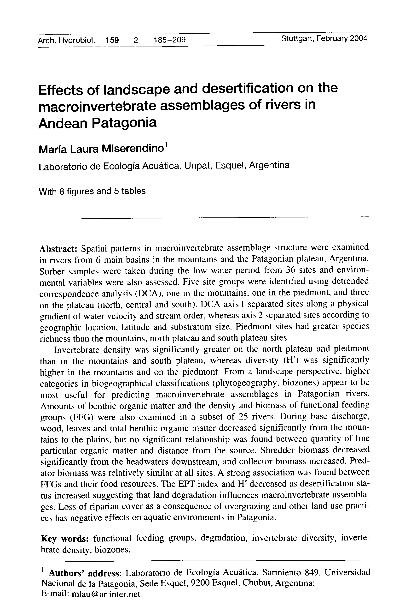Mostrar el registro sencillo del ítem
dc.contributor.author
Miserendino, Maria Laura

dc.date.available
2017-12-13T13:57:56Z
dc.date.issued
2004-02-20
dc.identifier.citation
Miserendino, Maria Laura; Effects of landscape and desertification on the macroinvertebrate assemblages of rivers in Andean Patagonia; E. Schweizerbart'sche Verlagsbuchhandlung; Archiv Fur Hydrobiologie; 159; 2; 20-2-2004; 185-209
dc.identifier.issn
0003-9136
dc.identifier.uri
http://hdl.handle.net/11336/30378
dc.description.abstract
Spatial patterns in macroinvertebrate assemblage structure were examined in rivers from 6 main basins in the mountains and the Patagonian plateau, Argentina. Surber samples were taken during the low water period from 36 sites and environmental variables were also assessed. Five site groups were identified using detrended correspondence analysis (DCA), one in the mountains, one in the piedmont, and three on the plateau (north, central and south). DCA axis 1 separated sites along a physical gradient of water velocity and stream order, whereas axis2 separated sites according to geographic location, latitude and substratum size. Piedmont sites had greater species richness than the mountains, north plateau and south plateau sites. Invertebrate density was significantly greater on the north plateau and piedmont than in the mountains and south plateau, whereas diversity (H′) was significantly higher in the mountains and on the piedmont. From a landscape perspective, higher categories in biogeographical classifications (phytogeography, biozones) appear to be most useful for predicting macroinvertebrate assemblages in Patagonian rivers. Amounts of benthic organic matter and the density and biomass of functional feeding groups (FFG) were also examined in a subset of 25 rivers. During base discharge, wood, leaves and total benthic organic matter decreased significantly from the mountains to the plains, but no significant relationship was found between quantity of fine particular organic matter and distance from the source. Shredder biomass decreased significantly from the headwaters downstream, and collector biomass increased. Predator biomass was relatively similar at all sites. A strong association was found between FFGs and their food resources. The EPT index and H′ decreased as desertification status increased suggesting that land degradation influences macroinvertebrate assemblages. Loss of riparian cover as a consequence of overgrazing and other land use practices has negative effects on aquatic environments in Patagonia
dc.format
application/pdf
dc.language.iso
eng
dc.publisher
E. Schweizerbart'sche Verlagsbuchhandlung
dc.rights
info:eu-repo/semantics/openAccess
dc.rights.uri
https://creativecommons.org/licenses/by-nc-sa/2.5/ar/
dc.subject
Biozones
dc.subject
Degradation
dc.subject
Functional Feeding Groups
dc.subject
Invertebrate Density
dc.subject
Invertebrate Diversity
dc.subject.classification
Otras Ciencias Biológicas

dc.subject.classification
Ciencias Biológicas

dc.subject.classification
CIENCIAS NATURALES Y EXACTAS

dc.title
Effects of landscape and desertification on the macroinvertebrate assemblages of rivers in Andean Patagonia
dc.type
info:eu-repo/semantics/article
dc.type
info:ar-repo/semantics/artículo
dc.type
info:eu-repo/semantics/publishedVersion
dc.date.updated
2017-11-24T14:32:55Z
dc.journal.volume
159
dc.journal.number
2
dc.journal.pagination
185-209
dc.journal.pais
Alemania

dc.journal.ciudad
Stuttgart
dc.description.fil
Fil: Miserendino, Maria Laura. Universidad Nacional de la Patagonia "san Juan Bosco". Facultad de Cs.naturales - Sede Esquel. Laboratorio de Ecología Acuatica; Argentina. Consejo Nacional de Investigaciones Científicas y Técnicas; Argentina
dc.journal.title
Archiv Fur Hydrobiologie

dc.relation.alternativeid
info:eu-repo/semantics/altIdentifier/doi/http://dx.doi.org/10.1127/0003-9136/2004/0159-0185
dc.relation.alternativeid
info:eu-repo/semantics/altIdentifier/url/http://www.ingentaconnect.com/content/schweiz/afh/2004/00000159/00000002/art00002
Archivos asociados
